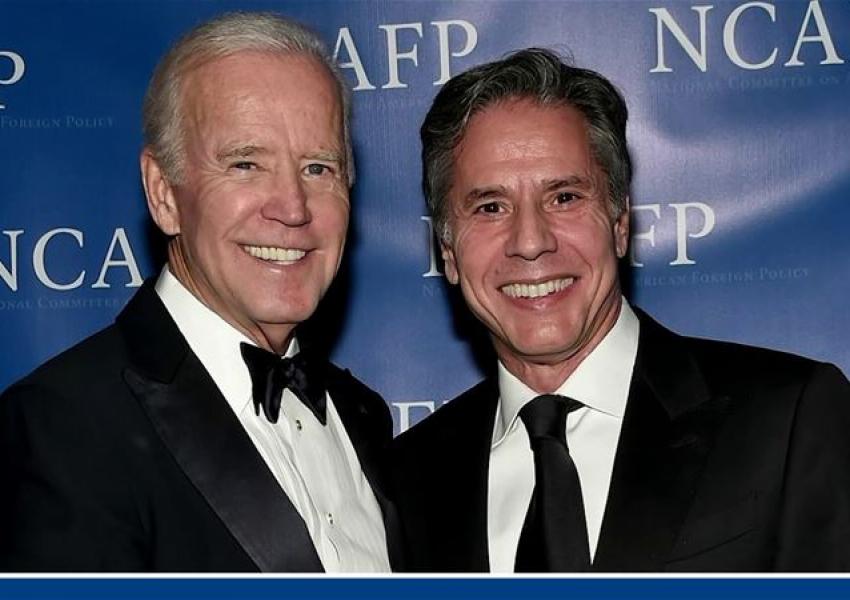
Will Biden And His Foreign-Policy Chief Revive The Iran Nuclear Deal?
Joe Biden’s picks for his foreign-policy team reflect his commitment to multilateralism, including a campaign promise to revive Iran’s 2015 nuclear deal with world powers, which President Donald Trump abandoned in 2018.
But how might a Biden administration approach the challenges in relaunching a lapsed deal in a world that has changed in five years?
Antony Blinken, Biden’s nominee as Secretary of State, will be crucial for the Iran file – whether or not Biden appoints a successor as Iran envoy to Eliott Abrams. Blinken’s closeness to Biden goes back to being his chief foreign policy adviser in the Senate after 2002; Blinken was later Biden’s security adviser as vice-president.
When the nuclear deal – the JCPOA, Joint Comprehensive Plan of Action – was signed in Vienna in July 2015, Blinken was Deputy Secretary of State, if less visible than then Secretary of State John Kerry, who held high-profile meetings with Mohammad Javad Zarif, Iran’s foreign minister.
‘Exceptional constraints’
How might Blinken approach Iran in 2021? His background, from school in Paris, suggests he will re-establish the co-operation with Europe – the ‘E3’ of France, Germany and Britain – that underlay the JCPOA. Intriguingly, Blinken will bring a human-rights commitment that will influence if not determine Middle East policy.
In March 2015, when the world powers (the US, the E3, Russia and China) were meeting Iranian negotiators in Switzerland, Blinken told the Senate Foreign Affairs Committee the US sought “exceptional constraints on Iran’s nuclear program and extraordinary monitoring and intrusive and transparency measures.” He explained a targeted year-long ‘break out time,’ the period Iran would need, after abandoning the restrictions, to make a weapon.
“In exchange” for these constraints, Blinken continued, world powers would ensure “phased, proportionate and reversible sanctions relief tied to verifiable actions.” As Iran established a “track record of verified compliance…continued monitoring and inspections” would prohibit Tehran “from developing a nuclear weapon in perpetuity” and give “a much greater ability to detect any effort by Iran to do so.”
This approach separated the nuclear file from other issues – which would lead to criticism from Gulf Arab leaders, from many in Israel, and from the Trump administration. Blinken stressed that the nuclear agreement would “not alter our commitment to the security of our allies” and that the US retained “the necessary tools and the determination to continue countering Iran’s troubling behavior.” The JCPOA could lead to further discussions on such matters.
‘Troubling behavior’
But JCPOA critics argued that Iran’s “troubling behavior” increased after 2015, financed by relaxed sanctions allowing access to frozen funds abroad and increasing revenue through oil sales and greater trade. When Trump left the JCPOA in 2018, Mike Pompeo in his first speech as Secretary of State threatened Tehran with “the strongest sanctions in history” unless it met 12 demands – including ending uranium enrichment, closing its heavy-water reactor, breaking links with regional allies, and ending “proliferation” of ballistic missiles.
Today’s argument as to whether ‘maximum pressure’ has failed or succeeded begs the question of how to judge. Since Trump left the JCPOA, the Iranian nuclear program has grown. Tehran since 2019 has taken a series of steps beyond JCPOA limits, enriching uranium to 4.5% from 3.67%, increasing fuel stocks to twelve times permitted levels, and using a barred type of centrifuge.
On the other hand, Israeli prime minister Benjamin Netanyahu and Saudi crown prince Mohammed bin Salman, who together met Pompeo on Sunday night, will tell Biden that ‘maximum pressure’ – which has slashed Iran’s oil exports and sent its economy into a three-years recession – gives leeway to extract further concessions, over the nuclear program and other issues.
But in Iran, opponents of the JCPOA are stronger than in 2015. They feel enhanced by February’s parliamentary election, Rouhani’s weakening, and confirmation of their core argument that Uncle Sam can never be trusted. They cite Iran’s long-standing opposition to weakening missile ‘deterrence,’ and argue that Tehran’s position has been strengthened by expanding its nuclear program.
Russia, China and the E3 all retain an official position that the JCPOA should be revived by both the US and Iran returning to their commitments. Rouhani and Zarif have presented a straightforward path to this goal.
‘New semi-allies’
But the Europeans, whose foreign ministers met in Berlin on Monday to discuss Iran, have also shown an openness to discuss widening the JCPOA and are keen to re-establish close relations with Washington.
Wendy Sherman, lead US negotiator for the JCPOA, has expressed doubts over an early breakthrough. “This will be difficult, hard work,” she told American public radio on November 11. “And I would suspect that President-elect Biden and his team will first start by talking with our European allies…and then with Russia and China, to see what might be the best way forward.”
Speaking on Tuesday to an Americans for Peace Now webinar, Yossi Alpher, former Mossad officer, pointed out that while Israel’s “security establishment” had mostly welcomed the JCPOA, Netanyahu and “our new semi-allies” Saudi Arabia and the United Arab Emirates would now seek Biden’s ear, for the first time approaching an American president as a unified “Middle East lobby.”
And there are still eight weeks to go even before Biden takes office.





